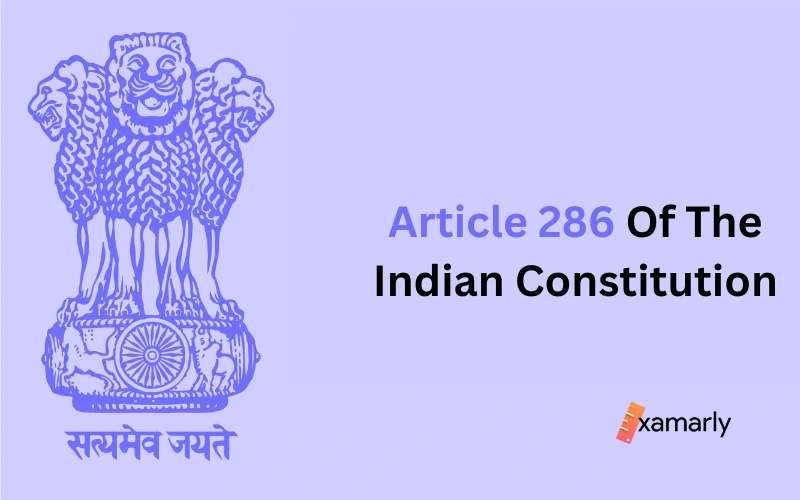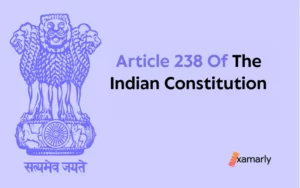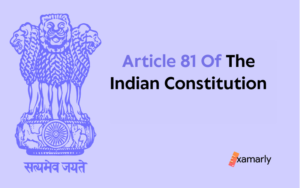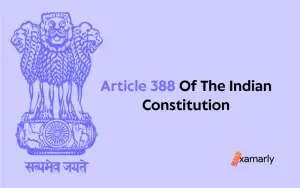An Overview
Have you ever wondered how is the imposition of tax regulated by any law of a State? Or how does the legislative authority of Parliament facilitate the framing of laws with respect to taxation?
Article 286 of the Indian Constitution deals with the limitations on the power of the States to levy taxes for the sale and purchase of goods.
In this detailed blog on Article 286, we will take a close look at its background, its clauses, the provisions it provides, the constitutional amendments associated with it and some frequently asked questions related to this article of the Indian Constitution.
- An Overview
- Background Of Article 286 Of The Indian Constitution
- What Does Article 286 Of The Indian Constitution Say?
- Clause (1) Of Article 286 Of The Indian Constitution: Explained
- Clause (2) Of Article 286 Of The Indian Constitution: Explained
- Article 286 Of The Indian Constitution And Some Related Revisions
- Constitutional Amendment Related To Article 286 Of The Indian Constitution
- Summing Up
- FAQs Related To Article 286 Of The Indian Constitution
- How Many Clauses Are There In Article 286 Of The Indian Constitution?
- Which Clause Of Article 286 Of The Indian Constitution Was Removed?
- Which Section Was Responsible For The Removal Of Clause (3) From Article 286 Of The Indian Constitution?
- What Did The Provision Contained In Clause (3) of Article 286 Of The Indian Constitution Say?
- Which Part Of The Constitution Of India holds Article 286?
Background Of Article 286 Of The Indian Constitution
Let us first have a look at the background of Article 286. This will help us in understanding the article in a clear and concise way.
- Article 286 of the Indian Constitution was finalised from Draft Article 264A. It was taken up for discussion on October 16, 1949.
- The newly inserted Draft Article prohibited the States from levying taxes on the sale of products that took place in other States . It also put restrictions on the importation or exportation of commodities inside or to India.
- It granted Parliament the authority to enact laws related to trade. Such laws prohibit the States from levying taxes on trade or commerce between other States.
- In addition, the Draft Article stated that in order for laws issued by the State on the taxation of products that are necessary for the “life of the society,” it would be valid only under a certain condition. The condition was that they would need the approval of the President of India before going into force.
- After a session of debate and discussion, the Draft Article was included into the Constitution of India. It was done on October 16, 1949, that is, the same day as it was introduced for discussion.
What Does Article 286 Of The Indian Constitution Say?
The opening sentence of Article 286 tells us that it is about the limitations that are put on the collection of taxes pertaining to either selling or purchasing of goods. Further, it goes on to specify the terms and conditions associated with the levying of taxes by means of any law made by a State. It also talks about the power accorded on Parliament with respect to the supply of goods or services or both.
This article of the Indian Constitution is composed of two clauses, namely- clause (1) and clause (2). Previously, clause (3) used to be a part of the article as well. However, it was eventually dropped from Article 286.
By analysing the clauses one at a time we will learn the meaning behind the provisions provided by the article. These have been quoted directly from the official text of the Constitution of India.
Clause (1) Of Article 286 Of The Indian Constitution: Explained
Restrictions as to imposition of tax on the sale or purchase of goods.—
(1) No law of a State shall impose, or authorise the imposition of, a tax on [the supply of goods or of services or both, where such supply takes place]—
(a) outside the State; or
(b) in the course of the import of the [goods or services or both] into, or export of the [goods or services or both] out of, the territory of India.
The first clause of this article specifies when is a State allowed to impose a tax on the supply of goods or services. The State is not even permitted to approve the levying of such a tax. In simple words, the clause states that a State is not allowed to impose a tax or allow the imposition of such a tax on the supply of goods as well as services that takes place outside of the State. It cannot impose a tax even on the import or export of goods or services into or out of the territory of India.
Essentially, this clause is intended to prevent the States from imposing taxes on activities that take place beyond their borders. It also intends to ensure that taxes on the import and export of goods and services are consistent across the country.
Clause (2) Of Article 286 Of The Indian Constitution: Explained
(2) Parliament may by law formulate principles for determining when a [supply of goods or of services or both] in any of the ways mentioned in clause (1).
The next clause of Article 286 appears to be related to the previous clause of this article of the Indian Constitution. The previous clause dealt with the imposition of taxes on the supply of goods or services by means of the law of a State.
The second clause renders upon Parliament, which is the legislative body of a country, the power as well as duty to create laws that outline the principles for determining when a supply of goods or services is subject to taxation.
Article 286 Of The Indian Constitution And Some Related Revisions
- Initially, Article 286 included a third clause, namely- clause (3). It was done away with because of Section 13.
- The words [the supply of goods or of services or both, where such supply takes place] contained in clause (1) of Article 286, was a substitution. It was inserted into the article in place of “the sale or purchase of goods where such sale or purchase takes place”.This replacement was possible because of the Constitution (One Hundred and First Amendment) Act, 2016.
- The words [goods or services or both]was substituted in place of “goods” due to Section 13.
- Article 286 of the Indian Constitution also included an explanation at the end of the first clause. This explanation pertaining to the provision of the first clause was removed through the Constitution (Sixth Amendment) Act, 1956.
- The initial part of clause (2) was substituted by Section 4, for both clause (2) as well as clause (3).
- In clause (2), the words [supply of goods or of services or both]was a replacement for “sale or purchase of goods takes place”. This was possible due to the Constitution (One Hundred and First Amendment) Act, 2016.
Constitutional Amendment Related To Article 286 Of The Indian Constitution
The Constitution (Sixth Amendment) Act, 1956, brought about a change in the text of Article 286 of the Indian Constitution. It reads as follows:
Amendment of article 286.-In article 286 of the Constitution,-
(a) in clause (1), the Explanation shall be omitted; and
(b) for clauses (2) and (3), the following clauses shall be
substituted, namely:-
“(2) Parliament may by law formulate principles for determining when a sale or purchase of goods takes place in any of the ways mentioned in clause (1).
(3) Any law of a State shall, in so far as it imposes or authorises the imposition of, a tax on the sale or purchase of goods declared by Parliament by law to be of special importance in inter-State trade or commerce, be subject to such restrictions and conditions in regard to the system of levy, rates and other incidents of the tax as Parliament may by law specify.”.
Under the Constitution (Forty-sixth Amendment) Act, 1982, an alteration was made to Article 286 of the Indian Constitution. It intended to substitute clause (3) of the article.
The proposed substitution for the clause has been quoted from the Statement of Objects and Reasons of the Constitution (Forty-sixth Amendment) Act, 1982. It reads as follows:
3. Amendment of article 286.-In article 286 of the Constitution, for clause (3), the following clause shall be substituted, namely:-
“(3) Any law of a State shall, in so far as it imposes, or authorises the imposition of,-
(a) a tax on the sale or purchase of goods declared by Parliament by law to be of special importance in inter-State trade or commerce; or
(b) a tax on the sale or purchase of goods, being a tax of the nature referred to in sub-clause (b), sub-clause (c) or sub-clause (d) of clause (29A) of article 366,
be subject to such restrictions and conditions in regard to the system of levy, rates and other incidents of the tax as Parliament may by law specify.”.
This amendment act of the Indian Constitution also suggested the revision of clause (3) of Article 286 of the Indian Constitution. The proposed amendment would give Parliament, which is the legislative body of a country the power to create laws that with respect to restrictions and conditions related to the taxation of certain transactions involving the transfer of goods.
The amendment would also allow parliament to specify the tax rates and other details of the tax on the right to use any goods.
Summing Up
After gaining an in-depth insight of Article 286 Of The Indian Constitution, we can come up with some conclusions. They have been listed below.
- Article 286 of the Indian Constitution deals with the taxation of the supply of goods and services levied by the States.
- The first clause of the article prohibits the States from imposing taxes on the supply of goods and services that take place outside of the State. It also puts a restriction on the import or export of goods and services into or out of the territory of India.
- The second clause of the article gives Parliament, the legislative body of the country, the exclusive power to create laws outlining the principles for determining when a supply of goods or services is subject to taxation.
- These provisions aim to prevent the States from imposing taxes on activities beyond their borders. They also intend to ensure the maintenance of consistency in the taxation of import and export of goods and services.
- Two constitutional amendments, namely- the Constitution (Forty-sixth Amendment) Act, 1982, and the Constitution (Sixth Amendment) Act, 1956 had an important role in the alteration of Article 286 Of The Indian Constitution.
In addition to the above-mentioned points, we also learnt about the background of the article, the alterations that were made to it and how the constitutional amendments changed the structure of the article in terms of substituting certain words, replacing these with new words and omitting the explanation to the clauses from the article.
FAQs Related To Article 286 Of The Indian Constitution
How Many Clauses Are There In Article 286 Of The Indian Constitution?
At present, Article 286 Of The Indian Constitution is composed of two clauses, namely- clause (1) and clause (2). There was an other clause (3) along with the present two clauses that got omitted eventually.
Which Clause Of Article 286 Of The Indian Constitution Was Removed?
Clause (3) was removed from the purview of of Article 286 Of The Indian Constitution. Only two clauses, clause (1) and clause (2) are a part of the article, as of now.
Which Section Was Responsible For The Removal Of Clause (3) From Article 286 Of The Indian Constitution?
Clause (3) of Article 286 Of The Indian Constitution was removed from the scope of the article because of Section 13.
What Did The Provision Contained In Clause (3) of Article 286 Of The Indian Constitution Say?
The provision in clause (3) of Article 286 Of The Indian Constitution that was removed explained that if a State law imposes a tax on the sale or purchase of goods that are considered important for inter-state trade or commerce, or if the tax is of a certain type (as specified in Article 366 of the Indian Constitution), then the State law must follow certain restrictions and conditions set by Parliament. These could be with respect to how the tax is levied, the rates of the tax, and other details of the tax.
Which Part Of The Constitution Of India holds Article 286?
Article 286 of the Indian Constitution is held in Part XII of the official document of the Constitution of India. Articles pertaining to the provisions related to finance, property, contracts, and suits are included in this Part of the Constitution of India. Also, Part XII goes by the title ‘Finance, Property, Contracts, and Suits’.






